Traits of a Successful Entrepreneur: Interview with Philip Green
VerifiedAdded on 2023/01/11
|8
|2456
|96
AI Summary
This report discusses the characteristics and traits of Philip Green, the CEO of Arcadia Group, based on an interview. It explores his innovative thinking, extrovert nature, and customer-focused approach that have contributed to his success as an entrepreneur. The report also analyzes the relation of the content to entrepreneurship theories such as diffusion of innovation theory and Schumpeter's innovation theory of profit.
Contribute Materials
Your contribution can guide someone’s learning journey. Share your
documents today.

Entrepreneurship
Secure Best Marks with AI Grader
Need help grading? Try our AI Grader for instant feedback on your assignments.
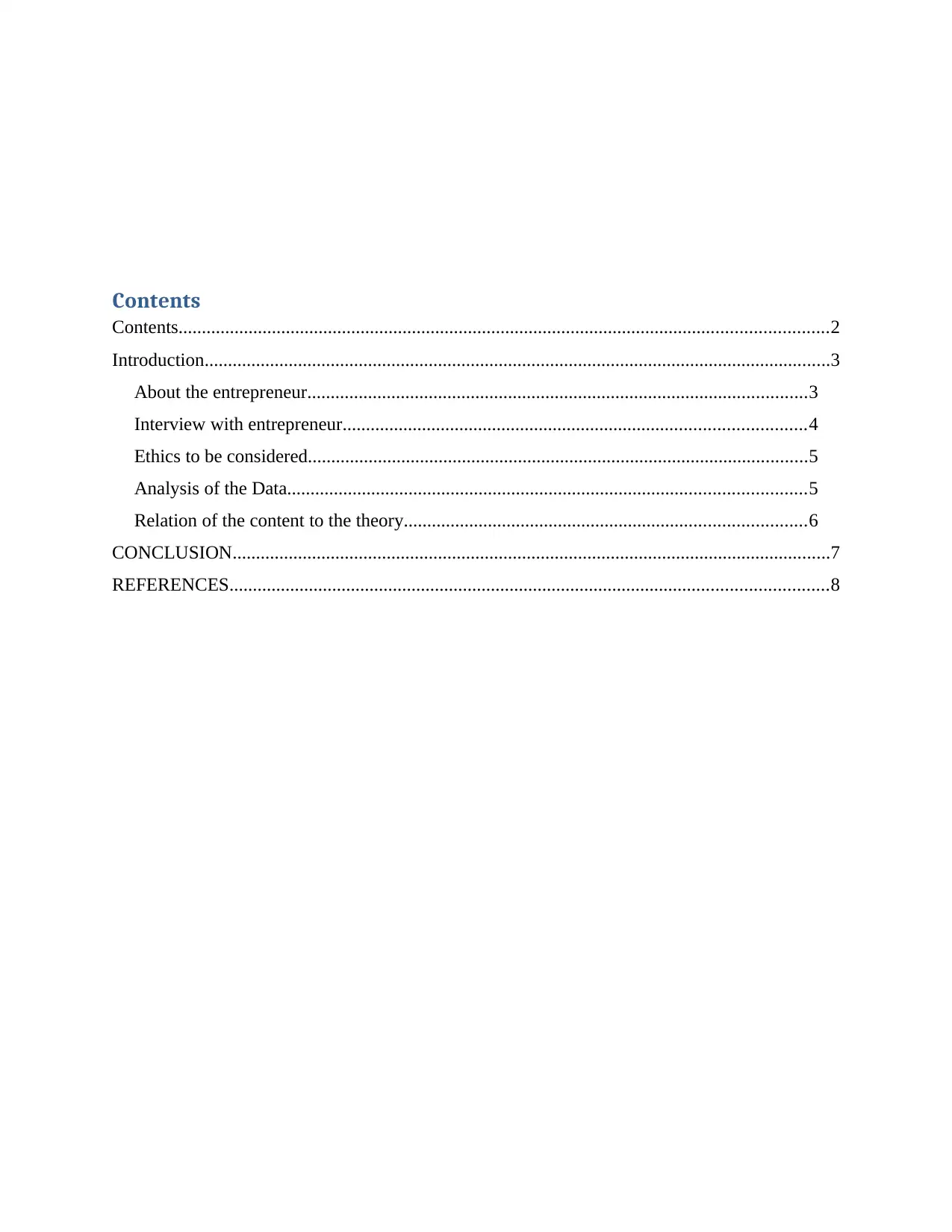
Contents
Contents...........................................................................................................................................2
Introduction......................................................................................................................................3
About the entrepreneur...........................................................................................................3
Interview with entrepreneur...................................................................................................4
Ethics to be considered...........................................................................................................5
Analysis of the Data...............................................................................................................5
Relation of the content to the theory......................................................................................6
CONCLUSION................................................................................................................................7
REFERENCES................................................................................................................................8
Contents...........................................................................................................................................2
Introduction......................................................................................................................................3
About the entrepreneur...........................................................................................................3
Interview with entrepreneur...................................................................................................4
Ethics to be considered...........................................................................................................5
Analysis of the Data...............................................................................................................5
Relation of the content to the theory......................................................................................6
CONCLUSION................................................................................................................................7
REFERENCES................................................................................................................................8
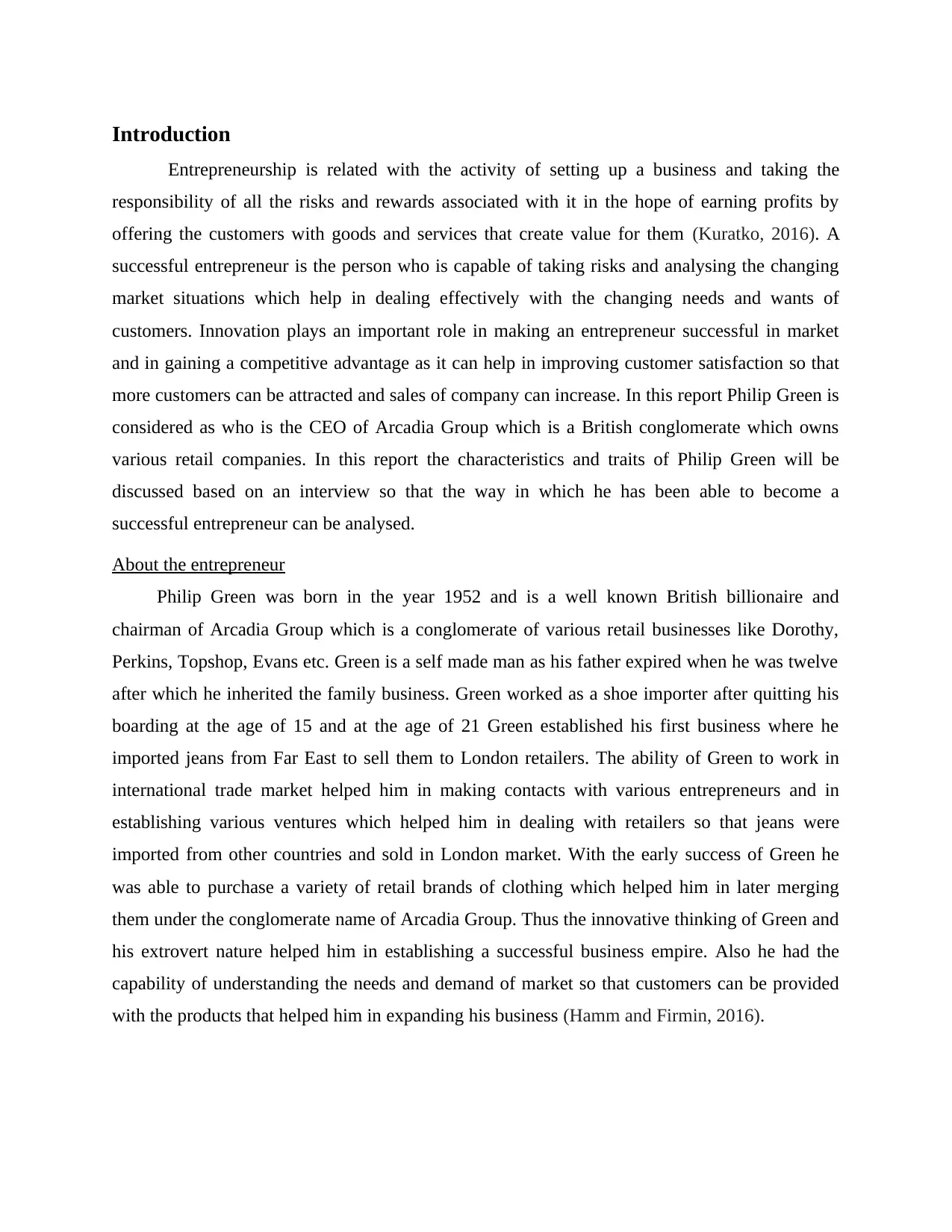
Introduction
Entrepreneurship is related with the activity of setting up a business and taking the
responsibility of all the risks and rewards associated with it in the hope of earning profits by
offering the customers with goods and services that create value for them (Kuratko, 2016). A
successful entrepreneur is the person who is capable of taking risks and analysing the changing
market situations which help in dealing effectively with the changing needs and wants of
customers. Innovation plays an important role in making an entrepreneur successful in market
and in gaining a competitive advantage as it can help in improving customer satisfaction so that
more customers can be attracted and sales of company can increase. In this report Philip Green is
considered as who is the CEO of Arcadia Group which is a British conglomerate which owns
various retail companies. In this report the characteristics and traits of Philip Green will be
discussed based on an interview so that the way in which he has been able to become a
successful entrepreneur can be analysed.
About the entrepreneur
Philip Green was born in the year 1952 and is a well known British billionaire and
chairman of Arcadia Group which is a conglomerate of various retail businesses like Dorothy,
Perkins, Topshop, Evans etc. Green is a self made man as his father expired when he was twelve
after which he inherited the family business. Green worked as a shoe importer after quitting his
boarding at the age of 15 and at the age of 21 Green established his first business where he
imported jeans from Far East to sell them to London retailers. The ability of Green to work in
international trade market helped him in making contacts with various entrepreneurs and in
establishing various ventures which helped him in dealing with retailers so that jeans were
imported from other countries and sold in London market. With the early success of Green he
was able to purchase a variety of retail brands of clothing which helped him in later merging
them under the conglomerate name of Arcadia Group. Thus the innovative thinking of Green and
his extrovert nature helped him in establishing a successful business empire. Also he had the
capability of understanding the needs and demand of market so that customers can be provided
with the products that helped him in expanding his business (Hamm and Firmin, 2016).
Entrepreneurship is related with the activity of setting up a business and taking the
responsibility of all the risks and rewards associated with it in the hope of earning profits by
offering the customers with goods and services that create value for them (Kuratko, 2016). A
successful entrepreneur is the person who is capable of taking risks and analysing the changing
market situations which help in dealing effectively with the changing needs and wants of
customers. Innovation plays an important role in making an entrepreneur successful in market
and in gaining a competitive advantage as it can help in improving customer satisfaction so that
more customers can be attracted and sales of company can increase. In this report Philip Green is
considered as who is the CEO of Arcadia Group which is a British conglomerate which owns
various retail companies. In this report the characteristics and traits of Philip Green will be
discussed based on an interview so that the way in which he has been able to become a
successful entrepreneur can be analysed.
About the entrepreneur
Philip Green was born in the year 1952 and is a well known British billionaire and
chairman of Arcadia Group which is a conglomerate of various retail businesses like Dorothy,
Perkins, Topshop, Evans etc. Green is a self made man as his father expired when he was twelve
after which he inherited the family business. Green worked as a shoe importer after quitting his
boarding at the age of 15 and at the age of 21 Green established his first business where he
imported jeans from Far East to sell them to London retailers. The ability of Green to work in
international trade market helped him in making contacts with various entrepreneurs and in
establishing various ventures which helped him in dealing with retailers so that jeans were
imported from other countries and sold in London market. With the early success of Green he
was able to purchase a variety of retail brands of clothing which helped him in later merging
them under the conglomerate name of Arcadia Group. Thus the innovative thinking of Green and
his extrovert nature helped him in establishing a successful business empire. Also he had the
capability of understanding the needs and demand of market so that customers can be provided
with the products that helped him in expanding his business (Hamm and Firmin, 2016).
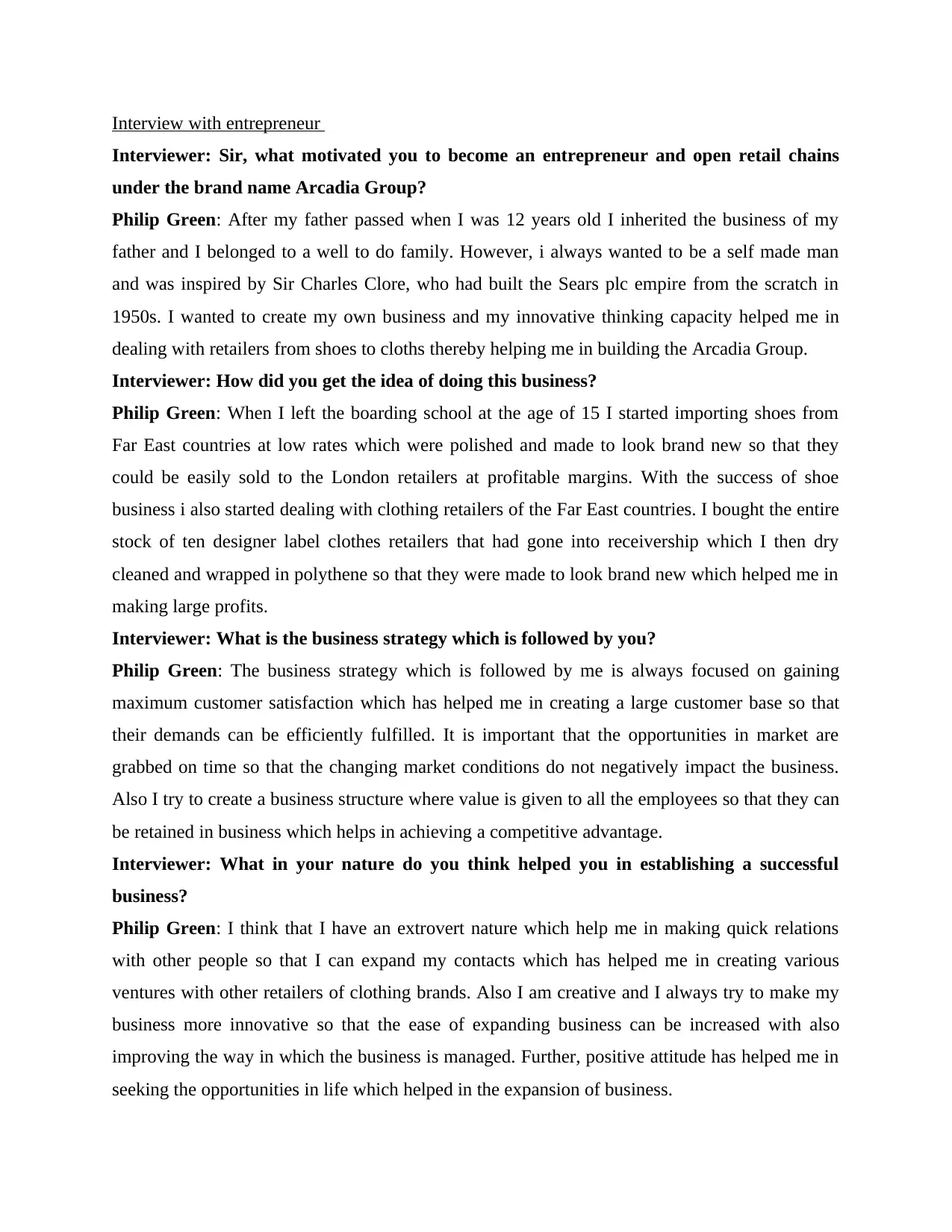
Interview with entrepreneur
Interviewer: Sir, what motivated you to become an entrepreneur and open retail chains
under the brand name Arcadia Group?
Philip Green: After my father passed when I was 12 years old I inherited the business of my
father and I belonged to a well to do family. However, i always wanted to be a self made man
and was inspired by Sir Charles Clore, who had built the Sears plc empire from the scratch in
1950s. I wanted to create my own business and my innovative thinking capacity helped me in
dealing with retailers from shoes to cloths thereby helping me in building the Arcadia Group.
Interviewer: How did you get the idea of doing this business?
Philip Green: When I left the boarding school at the age of 15 I started importing shoes from
Far East countries at low rates which were polished and made to look brand new so that they
could be easily sold to the London retailers at profitable margins. With the success of shoe
business i also started dealing with clothing retailers of the Far East countries. I bought the entire
stock of ten designer label clothes retailers that had gone into receivership which I then dry
cleaned and wrapped in polythene so that they were made to look brand new which helped me in
making large profits.
Interviewer: What is the business strategy which is followed by you?
Philip Green: The business strategy which is followed by me is always focused on gaining
maximum customer satisfaction which has helped me in creating a large customer base so that
their demands can be efficiently fulfilled. It is important that the opportunities in market are
grabbed on time so that the changing market conditions do not negatively impact the business.
Also I try to create a business structure where value is given to all the employees so that they can
be retained in business which helps in achieving a competitive advantage.
Interviewer: What in your nature do you think helped you in establishing a successful
business?
Philip Green: I think that I have an extrovert nature which help me in making quick relations
with other people so that I can expand my contacts which has helped me in creating various
ventures with other retailers of clothing brands. Also I am creative and I always try to make my
business more innovative so that the ease of expanding business can be increased with also
improving the way in which the business is managed. Further, positive attitude has helped me in
seeking the opportunities in life which helped in the expansion of business.
Interviewer: Sir, what motivated you to become an entrepreneur and open retail chains
under the brand name Arcadia Group?
Philip Green: After my father passed when I was 12 years old I inherited the business of my
father and I belonged to a well to do family. However, i always wanted to be a self made man
and was inspired by Sir Charles Clore, who had built the Sears plc empire from the scratch in
1950s. I wanted to create my own business and my innovative thinking capacity helped me in
dealing with retailers from shoes to cloths thereby helping me in building the Arcadia Group.
Interviewer: How did you get the idea of doing this business?
Philip Green: When I left the boarding school at the age of 15 I started importing shoes from
Far East countries at low rates which were polished and made to look brand new so that they
could be easily sold to the London retailers at profitable margins. With the success of shoe
business i also started dealing with clothing retailers of the Far East countries. I bought the entire
stock of ten designer label clothes retailers that had gone into receivership which I then dry
cleaned and wrapped in polythene so that they were made to look brand new which helped me in
making large profits.
Interviewer: What is the business strategy which is followed by you?
Philip Green: The business strategy which is followed by me is always focused on gaining
maximum customer satisfaction which has helped me in creating a large customer base so that
their demands can be efficiently fulfilled. It is important that the opportunities in market are
grabbed on time so that the changing market conditions do not negatively impact the business.
Also I try to create a business structure where value is given to all the employees so that they can
be retained in business which helps in achieving a competitive advantage.
Interviewer: What in your nature do you think helped you in establishing a successful
business?
Philip Green: I think that I have an extrovert nature which help me in making quick relations
with other people so that I can expand my contacts which has helped me in creating various
ventures with other retailers of clothing brands. Also I am creative and I always try to make my
business more innovative so that the ease of expanding business can be increased with also
improving the way in which the business is managed. Further, positive attitude has helped me in
seeking the opportunities in life which helped in the expansion of business.
Secure Best Marks with AI Grader
Need help grading? Try our AI Grader for instant feedback on your assignments.
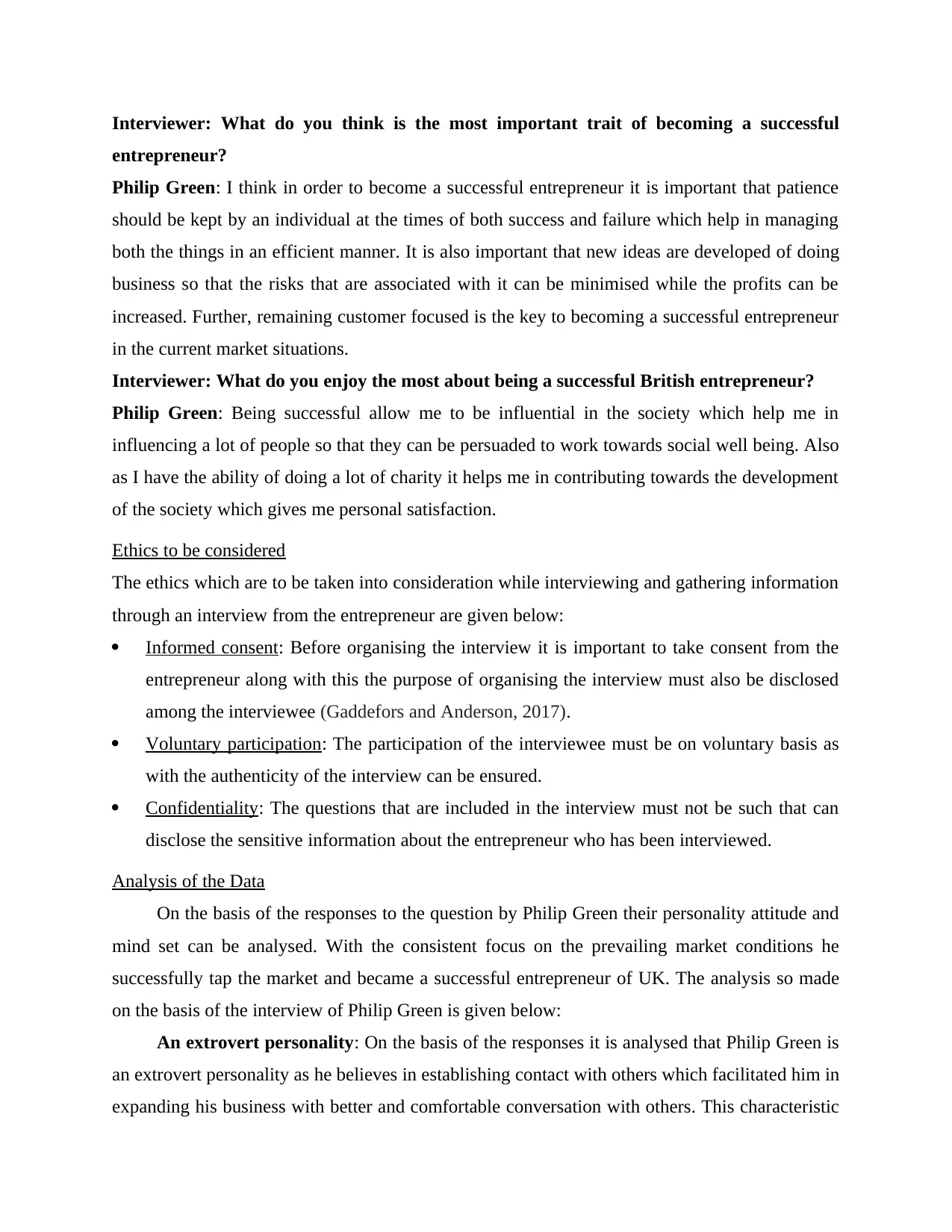
Interviewer: What do you think is the most important trait of becoming a successful
entrepreneur?
Philip Green: I think in order to become a successful entrepreneur it is important that patience
should be kept by an individual at the times of both success and failure which help in managing
both the things in an efficient manner. It is also important that new ideas are developed of doing
business so that the risks that are associated with it can be minimised while the profits can be
increased. Further, remaining customer focused is the key to becoming a successful entrepreneur
in the current market situations.
Interviewer: What do you enjoy the most about being a successful British entrepreneur?
Philip Green: Being successful allow me to be influential in the society which help me in
influencing a lot of people so that they can be persuaded to work towards social well being. Also
as I have the ability of doing a lot of charity it helps me in contributing towards the development
of the society which gives me personal satisfaction.
Ethics to be considered
The ethics which are to be taken into consideration while interviewing and gathering information
through an interview from the entrepreneur are given below:
Informed consent: Before organising the interview it is important to take consent from the
entrepreneur along with this the purpose of organising the interview must also be disclosed
among the interviewee (Gaddefors and Anderson, 2017).
Voluntary participation: The participation of the interviewee must be on voluntary basis as
with the authenticity of the interview can be ensured.
Confidentiality: The questions that are included in the interview must not be such that can
disclose the sensitive information about the entrepreneur who has been interviewed.
Analysis of the Data
On the basis of the responses to the question by Philip Green their personality attitude and
mind set can be analysed. With the consistent focus on the prevailing market conditions he
successfully tap the market and became a successful entrepreneur of UK. The analysis so made
on the basis of the interview of Philip Green is given below:
An extrovert personality: On the basis of the responses it is analysed that Philip Green is
an extrovert personality as he believes in establishing contact with others which facilitated him in
expanding his business with better and comfortable conversation with others. This characteristic
entrepreneur?
Philip Green: I think in order to become a successful entrepreneur it is important that patience
should be kept by an individual at the times of both success and failure which help in managing
both the things in an efficient manner. It is also important that new ideas are developed of doing
business so that the risks that are associated with it can be minimised while the profits can be
increased. Further, remaining customer focused is the key to becoming a successful entrepreneur
in the current market situations.
Interviewer: What do you enjoy the most about being a successful British entrepreneur?
Philip Green: Being successful allow me to be influential in the society which help me in
influencing a lot of people so that they can be persuaded to work towards social well being. Also
as I have the ability of doing a lot of charity it helps me in contributing towards the development
of the society which gives me personal satisfaction.
Ethics to be considered
The ethics which are to be taken into consideration while interviewing and gathering information
through an interview from the entrepreneur are given below:
Informed consent: Before organising the interview it is important to take consent from the
entrepreneur along with this the purpose of organising the interview must also be disclosed
among the interviewee (Gaddefors and Anderson, 2017).
Voluntary participation: The participation of the interviewee must be on voluntary basis as
with the authenticity of the interview can be ensured.
Confidentiality: The questions that are included in the interview must not be such that can
disclose the sensitive information about the entrepreneur who has been interviewed.
Analysis of the Data
On the basis of the responses to the question by Philip Green their personality attitude and
mind set can be analysed. With the consistent focus on the prevailing market conditions he
successfully tap the market and became a successful entrepreneur of UK. The analysis so made
on the basis of the interview of Philip Green is given below:
An extrovert personality: On the basis of the responses it is analysed that Philip Green is
an extrovert personality as he believes in establishing contact with others which facilitated him in
expanding his business with better and comfortable conversation with others. This characteristic
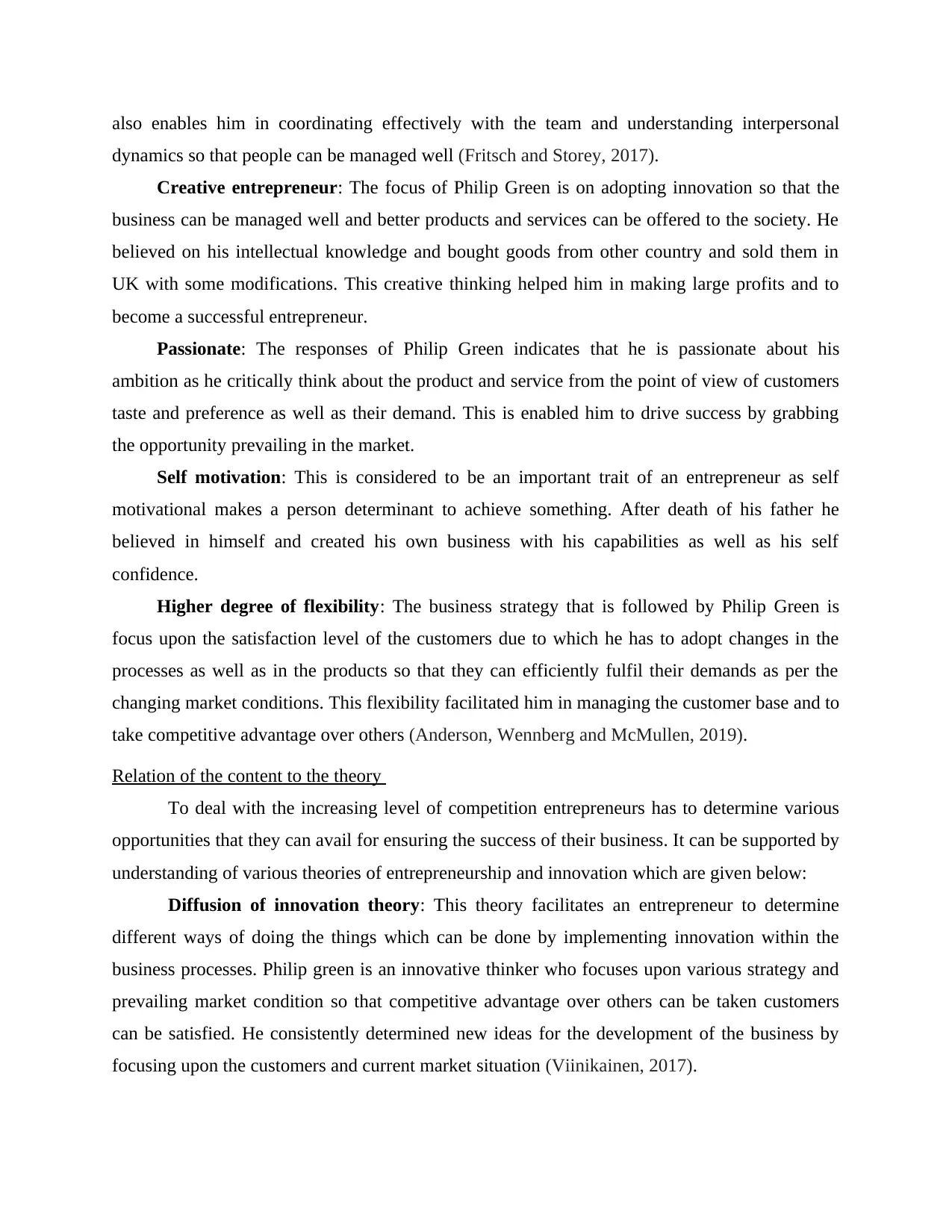
also enables him in coordinating effectively with the team and understanding interpersonal
dynamics so that people can be managed well (Fritsch and Storey, 2017).
Creative entrepreneur: The focus of Philip Green is on adopting innovation so that the
business can be managed well and better products and services can be offered to the society. He
believed on his intellectual knowledge and bought goods from other country and sold them in
UK with some modifications. This creative thinking helped him in making large profits and to
become a successful entrepreneur.
Passionate: The responses of Philip Green indicates that he is passionate about his
ambition as he critically think about the product and service from the point of view of customers
taste and preference as well as their demand. This is enabled him to drive success by grabbing
the opportunity prevailing in the market.
Self motivation: This is considered to be an important trait of an entrepreneur as self
motivational makes a person determinant to achieve something. After death of his father he
believed in himself and created his own business with his capabilities as well as his self
confidence.
Higher degree of flexibility: The business strategy that is followed by Philip Green is
focus upon the satisfaction level of the customers due to which he has to adopt changes in the
processes as well as in the products so that they can efficiently fulfil their demands as per the
changing market conditions. This flexibility facilitated him in managing the customer base and to
take competitive advantage over others (Anderson, Wennberg and McMullen, 2019).
Relation of the content to the theory
To deal with the increasing level of competition entrepreneurs has to determine various
opportunities that they can avail for ensuring the success of their business. It can be supported by
understanding of various theories of entrepreneurship and innovation which are given below:
Diffusion of innovation theory: This theory facilitates an entrepreneur to determine
different ways of doing the things which can be done by implementing innovation within the
business processes. Philip green is an innovative thinker who focuses upon various strategy and
prevailing market condition so that competitive advantage over others can be taken customers
can be satisfied. He consistently determined new ideas for the development of the business by
focusing upon the customers and current market situation (Viinikainen, 2017).
dynamics so that people can be managed well (Fritsch and Storey, 2017).
Creative entrepreneur: The focus of Philip Green is on adopting innovation so that the
business can be managed well and better products and services can be offered to the society. He
believed on his intellectual knowledge and bought goods from other country and sold them in
UK with some modifications. This creative thinking helped him in making large profits and to
become a successful entrepreneur.
Passionate: The responses of Philip Green indicates that he is passionate about his
ambition as he critically think about the product and service from the point of view of customers
taste and preference as well as their demand. This is enabled him to drive success by grabbing
the opportunity prevailing in the market.
Self motivation: This is considered to be an important trait of an entrepreneur as self
motivational makes a person determinant to achieve something. After death of his father he
believed in himself and created his own business with his capabilities as well as his self
confidence.
Higher degree of flexibility: The business strategy that is followed by Philip Green is
focus upon the satisfaction level of the customers due to which he has to adopt changes in the
processes as well as in the products so that they can efficiently fulfil their demands as per the
changing market conditions. This flexibility facilitated him in managing the customer base and to
take competitive advantage over others (Anderson, Wennberg and McMullen, 2019).
Relation of the content to the theory
To deal with the increasing level of competition entrepreneurs has to determine various
opportunities that they can avail for ensuring the success of their business. It can be supported by
understanding of various theories of entrepreneurship and innovation which are given below:
Diffusion of innovation theory: This theory facilitates an entrepreneur to determine
different ways of doing the things which can be done by implementing innovation within the
business processes. Philip green is an innovative thinker who focuses upon various strategy and
prevailing market condition so that competitive advantage over others can be taken customers
can be satisfied. He consistently determined new ideas for the development of the business by
focusing upon the customers and current market situation (Viinikainen, 2017).
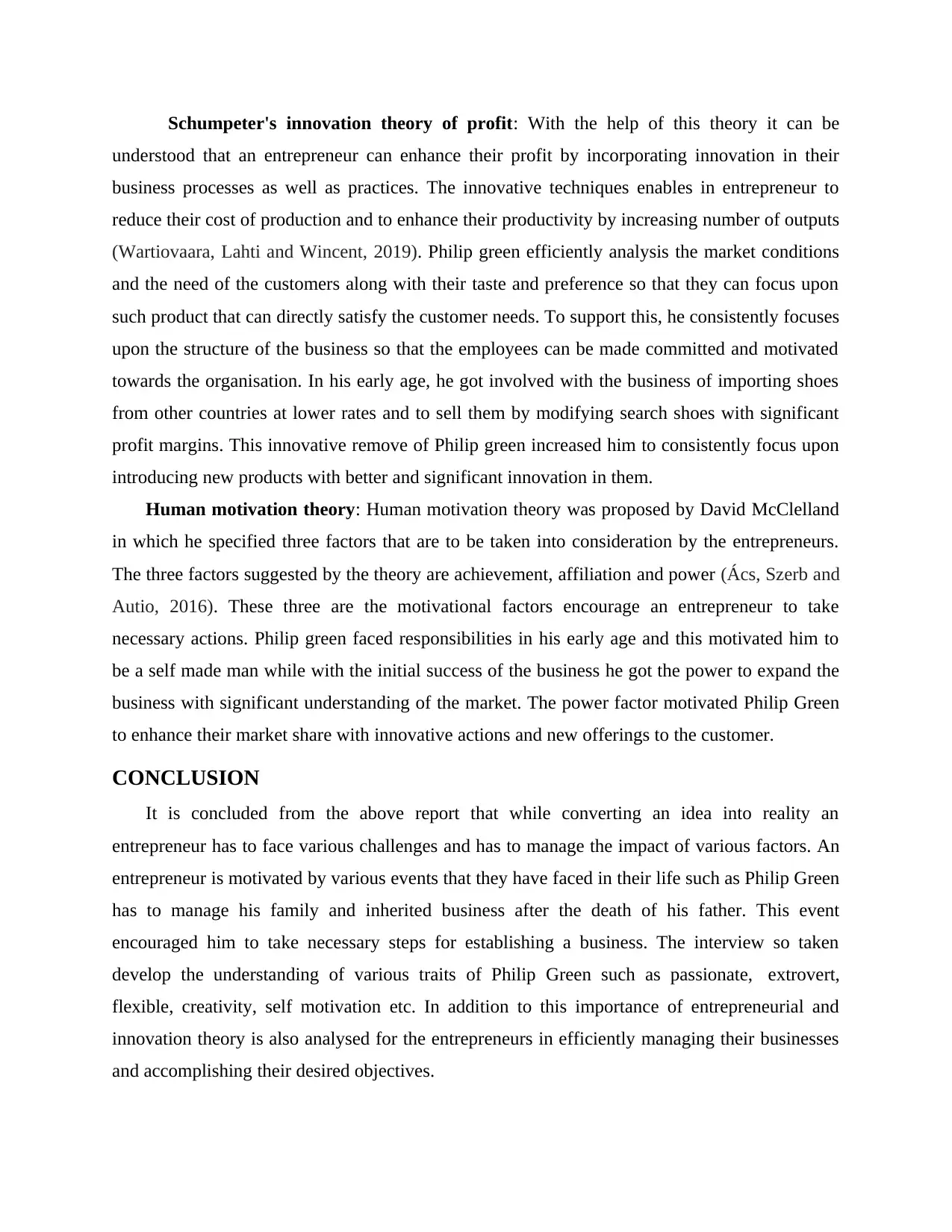
Schumpeter's innovation theory of profit: With the help of this theory it can be
understood that an entrepreneur can enhance their profit by incorporating innovation in their
business processes as well as practices. The innovative techniques enables in entrepreneur to
reduce their cost of production and to enhance their productivity by increasing number of outputs
(Wartiovaara, Lahti and Wincent, 2019). Philip green efficiently analysis the market conditions
and the need of the customers along with their taste and preference so that they can focus upon
such product that can directly satisfy the customer needs. To support this, he consistently focuses
upon the structure of the business so that the employees can be made committed and motivated
towards the organisation. In his early age, he got involved with the business of importing shoes
from other countries at lower rates and to sell them by modifying search shoes with significant
profit margins. This innovative remove of Philip green increased him to consistently focus upon
introducing new products with better and significant innovation in them.
Human motivation theory: Human motivation theory was proposed by David McClelland
in which he specified three factors that are to be taken into consideration by the entrepreneurs.
The three factors suggested by the theory are achievement, affiliation and power (Ács, Szerb and
Autio, 2016). These three are the motivational factors encourage an entrepreneur to take
necessary actions. Philip green faced responsibilities in his early age and this motivated him to
be a self made man while with the initial success of the business he got the power to expand the
business with significant understanding of the market. The power factor motivated Philip Green
to enhance their market share with innovative actions and new offerings to the customer.
CONCLUSION
It is concluded from the above report that while converting an idea into reality an
entrepreneur has to face various challenges and has to manage the impact of various factors. An
entrepreneur is motivated by various events that they have faced in their life such as Philip Green
has to manage his family and inherited business after the death of his father. This event
encouraged him to take necessary steps for establishing a business. The interview so taken
develop the understanding of various traits of Philip Green such as passionate, extrovert,
flexible, creativity, self motivation etc. In addition to this importance of entrepreneurial and
innovation theory is also analysed for the entrepreneurs in efficiently managing their businesses
and accomplishing their desired objectives.
understood that an entrepreneur can enhance their profit by incorporating innovation in their
business processes as well as practices. The innovative techniques enables in entrepreneur to
reduce their cost of production and to enhance their productivity by increasing number of outputs
(Wartiovaara, Lahti and Wincent, 2019). Philip green efficiently analysis the market conditions
and the need of the customers along with their taste and preference so that they can focus upon
such product that can directly satisfy the customer needs. To support this, he consistently focuses
upon the structure of the business so that the employees can be made committed and motivated
towards the organisation. In his early age, he got involved with the business of importing shoes
from other countries at lower rates and to sell them by modifying search shoes with significant
profit margins. This innovative remove of Philip green increased him to consistently focus upon
introducing new products with better and significant innovation in them.
Human motivation theory: Human motivation theory was proposed by David McClelland
in which he specified three factors that are to be taken into consideration by the entrepreneurs.
The three factors suggested by the theory are achievement, affiliation and power (Ács, Szerb and
Autio, 2016). These three are the motivational factors encourage an entrepreneur to take
necessary actions. Philip green faced responsibilities in his early age and this motivated him to
be a self made man while with the initial success of the business he got the power to expand the
business with significant understanding of the market. The power factor motivated Philip Green
to enhance their market share with innovative actions and new offerings to the customer.
CONCLUSION
It is concluded from the above report that while converting an idea into reality an
entrepreneur has to face various challenges and has to manage the impact of various factors. An
entrepreneur is motivated by various events that they have faced in their life such as Philip Green
has to manage his family and inherited business after the death of his father. This event
encouraged him to take necessary steps for establishing a business. The interview so taken
develop the understanding of various traits of Philip Green such as passionate, extrovert,
flexible, creativity, self motivation etc. In addition to this importance of entrepreneurial and
innovation theory is also analysed for the entrepreneurs in efficiently managing their businesses
and accomplishing their desired objectives.
Paraphrase This Document
Need a fresh take? Get an instant paraphrase of this document with our AI Paraphraser
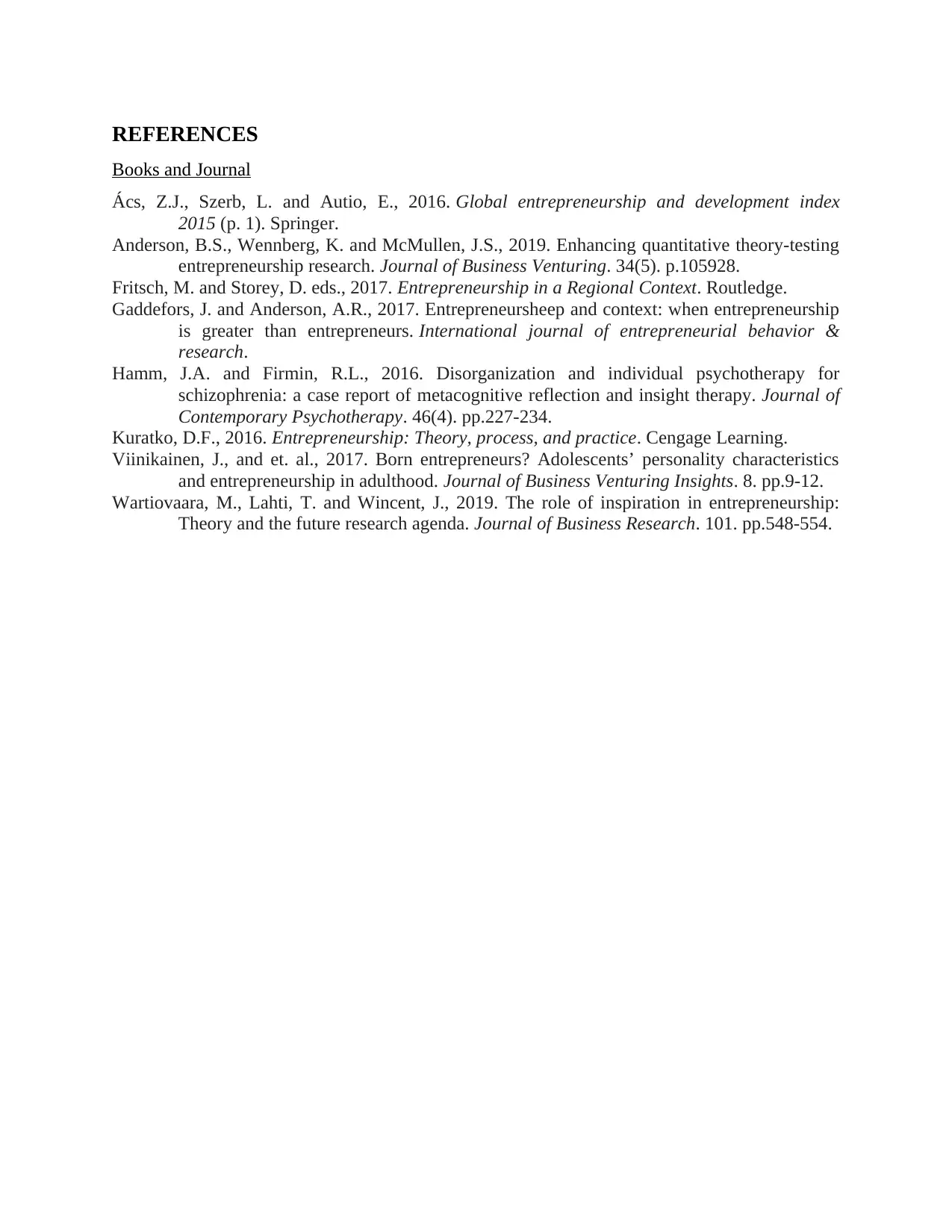
REFERENCES
Books and Journal
Ács, Z.J., Szerb, L. and Autio, E., 2016. Global entrepreneurship and development index
2015 (p. 1). Springer.
Anderson, B.S., Wennberg, K. and McMullen, J.S., 2019. Enhancing quantitative theory-testing
entrepreneurship research. Journal of Business Venturing. 34(5). p.105928.
Fritsch, M. and Storey, D. eds., 2017. Entrepreneurship in a Regional Context. Routledge.
Gaddefors, J. and Anderson, A.R., 2017. Entrepreneursheep and context: when entrepreneurship
is greater than entrepreneurs. International journal of entrepreneurial behavior &
research.
Hamm, J.A. and Firmin, R.L., 2016. Disorganization and individual psychotherapy for
schizophrenia: a case report of metacognitive reflection and insight therapy. Journal of
Contemporary Psychotherapy. 46(4). pp.227-234.
Kuratko, D.F., 2016. Entrepreneurship: Theory, process, and practice. Cengage Learning.
Viinikainen, J., and et. al., 2017. Born entrepreneurs? Adolescents’ personality characteristics
and entrepreneurship in adulthood. Journal of Business Venturing Insights. 8. pp.9-12.
Wartiovaara, M., Lahti, T. and Wincent, J., 2019. The role of inspiration in entrepreneurship:
Theory and the future research agenda. Journal of Business Research. 101. pp.548-554.
Books and Journal
Ács, Z.J., Szerb, L. and Autio, E., 2016. Global entrepreneurship and development index
2015 (p. 1). Springer.
Anderson, B.S., Wennberg, K. and McMullen, J.S., 2019. Enhancing quantitative theory-testing
entrepreneurship research. Journal of Business Venturing. 34(5). p.105928.
Fritsch, M. and Storey, D. eds., 2017. Entrepreneurship in a Regional Context. Routledge.
Gaddefors, J. and Anderson, A.R., 2017. Entrepreneursheep and context: when entrepreneurship
is greater than entrepreneurs. International journal of entrepreneurial behavior &
research.
Hamm, J.A. and Firmin, R.L., 2016. Disorganization and individual psychotherapy for
schizophrenia: a case report of metacognitive reflection and insight therapy. Journal of
Contemporary Psychotherapy. 46(4). pp.227-234.
Kuratko, D.F., 2016. Entrepreneurship: Theory, process, and practice. Cengage Learning.
Viinikainen, J., and et. al., 2017. Born entrepreneurs? Adolescents’ personality characteristics
and entrepreneurship in adulthood. Journal of Business Venturing Insights. 8. pp.9-12.
Wartiovaara, M., Lahti, T. and Wincent, J., 2019. The role of inspiration in entrepreneurship:
Theory and the future research agenda. Journal of Business Research. 101. pp.548-554.
1 out of 8
Related Documents
Your All-in-One AI-Powered Toolkit for Academic Success.
+13062052269
info@desklib.com
Available 24*7 on WhatsApp / Email
![[object Object]](/_next/static/media/star-bottom.7253800d.svg)
Unlock your academic potential
© 2024 | Zucol Services PVT LTD | All rights reserved.



